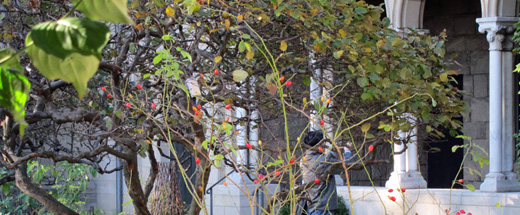Daily Office:
Thursday, 2 December 2010
Matins ¶ Maureen Freely discusses her rich life as a translator of Orhan Pamuk. She doesn’t note, for some reason, that she grew up in Istanbul and makes her home there, but she does remark on the very unusual, not to say unnatural, role that has been projected upon her by Turkish chauvinists who resent the critical cast of their Nobelist novelist’s mind. “Many Turks who feel ambivalent about Pamuk like to attribute his international success and most especially his Nobel prize to his translators, who have, they claim, ‘improved his words for western consumption’.” What kind of bed do you have to get up out of in the morning in order to think such nonsense? (Guardian; via Arts Journal)
Lauds ¶ Maybe you had to be there, the other night at the 92nd Street Y. According to Felicia Lee’s story in the Times, Steve Martin and interviewer Deborah Solomon had an onstage conversation about the art world. That’s what Mr Martin’s new novel, An Object of Beauty, is about. According to Martin Schneider at Emdashes, however, Ms Solomon “alienate[d] the audience” with a clunky book report. Either way, the audience was palpably discontented, and a stagehand was sent out with a note to the intterviewer: “Ask him about his career.” We have only one thing to say about this kind of audience passivism: it is not a good idea, because the artistic reaction against such philistinism will inevitably impose classical-music-concert restraints, leaving the audience no choice but to sit still and applaud at appoointed times. No matter how bad the performance.
Prime ¶ At The Baseline Scenario, Simon Johnson explores the concept of “too big to bail.” Noting that any Eurozone member can veto the easy-out proposition that another member is “merely illiquid,” he goes on to ask how deep are the pockets that Europe can dig into for rescue efforts. How rich, for example, is the IMF? “[B]ottom line: the IMF has no more than $1 trillion, but in terms of usable cash, the experts start to look pale as you discuss committing more than $500bn.”
Tierce ¶ Recent studies of the hormone oxytocin, written up by Ed Yong at Not Exactly Rocket Science, point to an intuitively more correct understanding of just what it is that this chemical does in the brain. Long thought to cause powerful feelings of bonding, oxytocin has now been shown to be more of an intensifier that strengthens existing predispositions — such as resentment for the lack of maternal bonding. By now, you’d think, the claim that any single agent in brain chemistry always triggers something as complex as an emotional state of mind would be laughed out of court, but the hunger for Wonderland cookies that have an immediate and invariable effect is obstinately persistent.
Sext ¶ Don’t miss Jessica Roake’s insight into the “Hide/Seek” brouhaha at the National Gallery. Takeaway pearl: “Which means that all of the works on display at Hide/Seek have been shown before; it’s the context that’s new, and it’s the context that makes people so uncomfortable. The curators built the show because they were tired of seeing, as Katz said, ‘Museum after museum where they don’t mention the partners, the autobiography, the question of gender and sexuality. It’s hiding in plain sight, yet no one has put it together’.” (The Awl)
Nones ¶ One of the most arresting peculiarities of the political development of the United States is its proliferation of competing and overlapping jurisdictions (read: power bases), which makes getting anything done almost as impossible as it was in the European Middle Ages. It is commonly thought that Europe’s patchwork of provinces was stitched together slowly during the Dark Ages, but the sclerotic complication of American governance took place in the clear light of day. Now that our partisan climate is reminiscent of the feuds of the Guelphs and the Ghibellines, our political redundancies work to paralyse, not support, civic affairs. As Robert McCartney’s piece about the DC Metro so maddeningly shows. (Washington Post; via Marginal Revolution)
Vespers ¶ Levi Stahl, whose blog, Ivebeenreadinglately, we encountered thanks to Terry Teachout, appraises Virginia Woolf’s gifts as a critic, which we have always regarded as first-rate. Woolf wrote for readers, not for people who wanted to be in the know without actually bothering with books. You may not agree with her judgments, but that is not the point; the point is that they are never ill-considered or foolish. (We especially agree with her remark about Dickens, quoted in the entry; we don’t think that Dickens had the faintest idea what he was doing. The wonder is that there are readers who do.)
Compline ¶ Hard times in Mitchell, SD: “In today’s world, an arena with corn on it is less interesting by the year.” When that’s what the local newspaper has to say about the Corn Palace, melancholy thoughts ensue. Some time ago, we proposed that the city fathers establish a Museum of High School Yearbooks across the street. We freely offer this brilliant idea. We have never recovered from our own visit to the Corn Palace, in 1963. CE. (LA Times; via Arts Journal)
¶ Probe Field (BLDGBLOG)
¶ Nige appreciates Osbert Lancaster.

